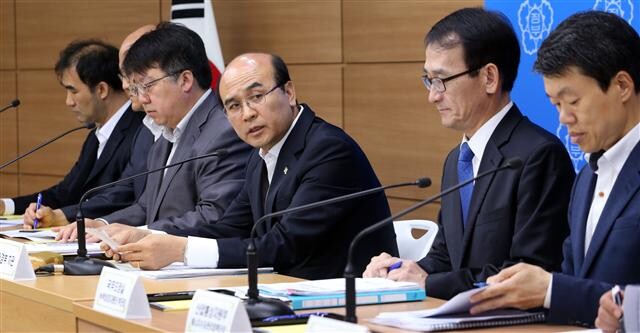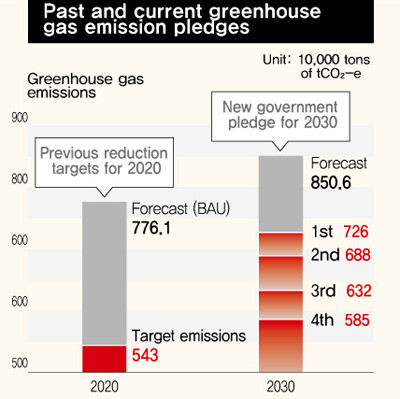hankyoreh
Links to other country sites 다른 나라 사이트 링크
[Analysis] In backpedaling on greenhouse gas emissions, Seoul risks int’l backlash

The South Korean government is facing heavy criticism after presenting a revised greenhouse gas reduction plan that effectively undoes targets previously pledged to the international community.
Seoul said in 2009 that it planned to reduce South Korea’s greenhouse gas emissions by 30% from business-as-usual (BAU) levels for 2020.
The Prime Minister’s Office (PMO) and other government agencies involved in setting the new greenhouse gas reduction plan, including the Ministries of Foreign Affairs, Environment, and Trade, Industry and Energy, announced four potential future scenarios during a joint briefing on June 11 at the Government Complex in Sejong. The four scenarios represented targets of 14.7%, 19.2%, 25.7%, and 31.3% of BAU greenhouse gas emissions for the country as of 2030.
The agencies went on to say they would gather opinions from various fields before making a final decision and submitting the South Korean contribution plan to the United Nations around the end of the month.
Despite the major retreat from previous targets, the business community has so far found the new plans short of its expectations. Meanwhile, environmental groups have accused Seoul of ignoring the country’s responsibility as one of the world’s top seven greenhouse gas emitters and attempting to piggyback on the rest of the world’s climate change response efforts.
The government’s announcement may also cause some controversy in future international climate negotiations, since it could be read as a violation of the “no reversals” principle agreed upon for greenhouse reduction plans at last year’s Climate Change Conference in Lima, Peru.
Seoul: ‘2020 targets tough to meet’

Assuming current emissions trends keep up, the South Korean government projected a 2030 total of 850.6 million tons of carbon dioxide equivalent (tCO₂-e), which would raise the 2020 prediction to 782.5 million tCO₂-e - an increase of 6.4 million tCO₂-e from earlier projections. By that standard, allowable greenhouse gas emissions for 2030 reach between 585 million and 726 million tCO₂-e, or up to 5.5% higher than 2012 levels.
But even the most stringent of the administration’s scenarios would exceed the maximum allowable emissions of 543 million tCO₂-e for 2020 announced by the Lee Myung-bak administration (2008-2013) at the Copenhagen Climate Change Conference in 2009. Also, because the contribution plan Seoul submits to the UN would require continued reductions in emissions through 2030, all four of the scenarios announced this week would entail exceeding the previous targets for 2020.
“Whichever one we go with out of the four scenarios submitted to the administration, it’s going to be tough to meet the previous 2020 reduction goals,” said PMO green growth support team deputy director Lim Seok-kyu at the June 11 briefing.
Lim went on to say that the 2020 goals were likely to be recalculated.
“The 2020 reduction levels will be decisions through discussions by the relevant agencies once the final 2030 targets are set,” he explained.
2020 targets a PR ploy?
While South Korea is not one of the countries required to cut emissions according to the Kyoto Protocol, its announcement of 2020 targets at the 2009 meeting in Copenhagen, together with its introduction of a trading system for emission rights, helped it gain a reputation in the international community as a model state for climate change response. Its success in beating out Germany for the Green Climate Fund secretariat in Oct. 2012 was attributed by the administration to its emphasis on the voluntary commitment to reducing emissions by 30% for predicted levels, and its active efforts to promote its leading role in the international response to climate change.
If it does abandon its pledge now, it is likely to face accusations from the international community that its 2020 targets were merely a cynical grab for immediate gains. None of the 38 advanced or developing economies that have submitted contribution plans to the UN have yet included any reversals from previously announced reduction targets. If Seoul does decide on a final 2030 target plan that walks back its 2020 pledge, it could face the stigma of being the first country to violate the “no reversals” principle agreed upon in Lima.
International community unlikely to be convinced
When countries submit contribution plans to the UN with their long-term reduction targets, they have to present the basis they used in setting the plan and explain how ambitious and fair they are in terms of the country’s ability and responsibility for climate change. In its previous national report to the UN Framework Convention on Climate Change secretariat last December, South Korea reaffirmed its 2020 targets, which it said had been chosen based on scientific and objective analysis. Just six months later, it now finds itself having to reject the very same “scientific” and “objective” analysis and figures.
Experts who took part in a joint government-civilian inspection group preparing the targets explained that the projections for industry structure were “unreasonable.”
“The projected short term GDP growth rate, which is the most important factor in calculating projected greenhouse gas emissions, has been continuously dropping, while the administration has insisted on its past projections for the growth rate, and high energy consumption industries are expected to continue accounting for a crucial share in the future,” they explained.
“If an international inspection were to turn up the internal data used to calculate future standard emissions, they would be used of inflating the emissions projections,” they added.
By Kim Jung-soo, senior staff writer
Please direct questions or comments to [english@hani.co.kr]

Editorial・opinion
![[Column] Has Korea, too, crossed the Rubicon on China? [Column] Has Korea, too, crossed the Rubicon on China?](https://flexible.img.hani.co.kr/flexible/normal/500/300/imgdb/original/2024/0419/9317135153409185.jpg) [Column] Has Korea, too, crossed the Rubicon on China?
[Column] Has Korea, too, crossed the Rubicon on China?![[Correspondent’s column] In Japan’s alliance with US, echoes of its past alliances with UK [Correspondent’s column] In Japan’s alliance with US, echoes of its past alliances with UK](https://flexible.img.hani.co.kr/flexible/normal/500/300/imgdb/original/2024/0419/2317135166563519.jpg) [Correspondent’s column] In Japan’s alliance with US, echoes of its past alliances with UK
[Correspondent’s column] In Japan’s alliance with US, echoes of its past alliances with UK- [Editorial] Does Yoon think the Korean public is wrong?
- [Editorial] As it bolsters its alliance with US, Japan must be accountable for past
- [Guest essay] Amending the Constitution is Yoon’s key to leaving office in public’s good graces
- [Editorial] 10 years on, lessons of Sewol tragedy must never be forgotten
- [Column] A death blow to Korea’s prosecutor politics
- [Correspondent’s column] The US and the end of Japanese pacifism
- [Guest essay] How Korea turned its trainee doctors into monsters
- [Guest essay] As someone who helped forge Seoul-Moscow ties, their status today troubles me
Most viewed articles
- 1[Column] The clock is ticking for Korea’s first lady
- 2Hong Se-hwa, voice for tolerance whose memoir of exile touched a chord, dies at 76
- 3After 2 months of delayed, denied medical care, Koreans worry worst may be yet to come
- 4[Column] Has Korea, too, crossed the Rubicon on China?
- 5[Correspondent’s column] In Japan’s alliance with US, echoes of its past alliances with UK
- 6US overtakes China as Korea’s top export market, prompting trade sanction jitters
- 7Samsung barricades office as unionized workers strike for better conditions
- 8All eyes on Xiaomi after it pulls off EV that Apple couldn’t
- 9More South Koreans, particularly the young, are leaving their religions
- 10John Linton, descendant of US missionaries and naturalized Korean citizen, to lead PPP’s reform effo